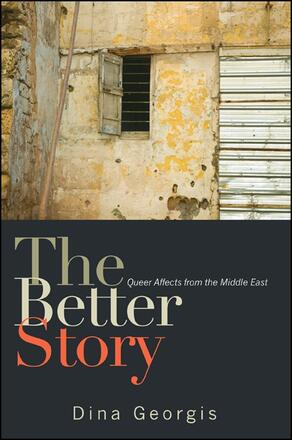
The Better Story
Queer Affects from the Middle East
Alternative formats available from:
Illuminates the emotional significance of stories in response to racial traumas related to the Middle East.
Description
Finalist for the 2014 Next Generation Indie Book Awards in the GLBT category
With a focus on aesthetic texts that narrate stories about or from the Middle East, The Better Story offers fresh insights into political conflict. Dina Georgis argues that narrative is an emotional resource for learning and for generating better political futures. This book suggests that narrative not only gives us insight into social constructs, but also leads us into understanding the enigmatic processes by which we become and give our "selfs" over to collective memories, histories, and identities. Stories link us to queer "forgotten" spaces that official history has discarded. The Better Story argues that feminist, queer, and postcolonial studies have not helped us think about lives that do not neatly fit into the valorized logic of resistance and emancipation.
Dina Georgis is Assistant Professor at the Women and Gender Studies Institute at the University of Toronto.
Reviews
"...Georgis makes a compelling case for a better, more complex and queer-inclusive narrative of self and community that would reduce the amount of hate in the world." — James Morgan Brown Review
"Written with a rare combination of theoretical savvy and personal voice, the book works through a fascinating collection of contemporary texts marked by the history of European and Zionist/Israeli colonialism, the legacies of sectarian violence, and the emergence of neo-Islamic fundamentalisms and terrorisms in the West Asia region … The Better Story paves the way for a new kind of psychoanalytic postcolonial studies which is at once more attuned to the devastations of historical trauma and more hopeful about the possibility of a different, and indeed better, future." — New Formations
"The Better Story highlights the centrality of narrative as a means by which to frame a theory of affect and representation. It builds on the key insight that stories are founded in loss and, therefore, bear the marks of suffering, grief, melancholy, and reparation. This 'haunting' is the place from which the author begins an investigation into colonial subjectivity and its histories of/and affect. The author's use of 'queer' to describe stories which incite and realize complex and ever emerging affective dynamics is both compelling and effective. As an account of such complexities, it is well done and convincing. The Better Story is a better story." — Ursula A. Kelly, author of Migration and Education in a Multicultural World: Culture, Loss, and Identity